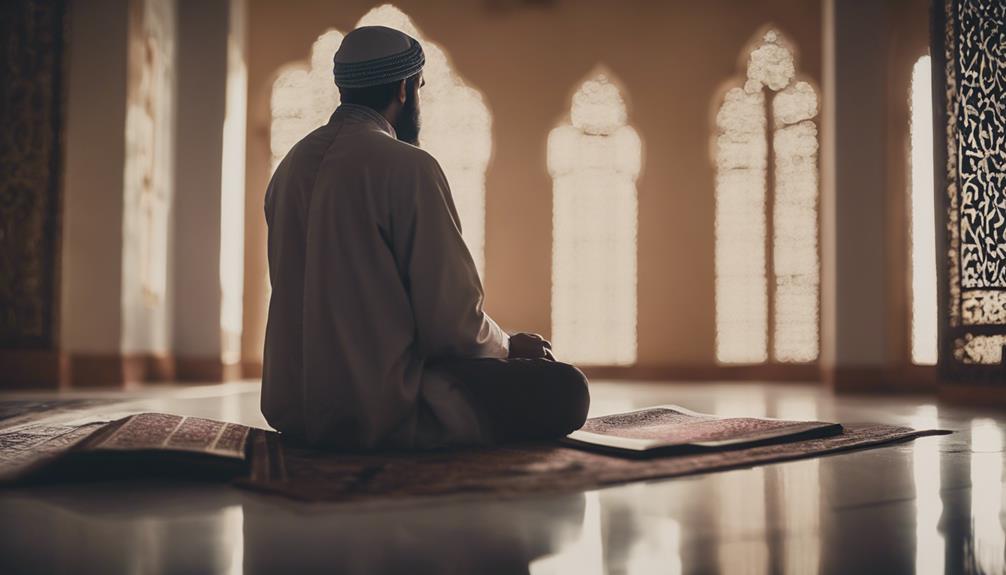Spiritual Self-Care: Nurturing the Soul Through Islamic Practices and Reflection
Nurturing your soul through Islamic practices and reflection is a sacred journey. Embrace daily prayer for inner peace, use Dhikr to cultivate gratitude, and reflect on the Quran for spiritual growth. Seek healing through Istighfar, find strength in patience amid trials, and deepen faith through Sadaqah. Connect with others in worship, seek knowledge to enrich your spiritual path, and practice gratitude for peace. These practices offer profound soul nourishment and a closer bond with the Divine. Expand your spiritual well-being by implementing these Islamic practices in your daily life.
Key Takeaways
- Daily prayer fosters spiritual connection and inner peace.
- Dhikr practice cultivates gratitude and tranquility.
- Quranic reflection aids in spiritual growth and enlightenment.
- Istighfar cleanses the soul and brings peace.
- Embracing patience in trials leads to resilience and growth.
The Power of Daily Prayer
Engaging in daily prayer serves as a profound spiritual practice that fosters connection and inner peace. Through the act of prayer, one not only fulfills a religious obligation but also engages in a form of meditation that brings numerous benefits to the mind and soul. Prayer allows for a moment of stillness and reflection, serving as a conduit for mindfulness techniques that help in grounding oneself in the present moment.
Incorporating mindfulness techniques into daily prayers can enhance one's spiritual experience. By focusing on each movement and recitation, individuals can cultivate a deeper sense of awareness and connection with the divine. This practice of mindfulness during prayer can lead to increased concentration, a sense of calm, and a heightened spiritual presence.
Benefits of Dhikr Practice
Engaging in Dhikr practice can bring you inner peace by allowing you to focus on the remembrance of the divine.
Through Dhikr, you can cultivate a sense of gratitude for the blessings in your life, fostering a positive mindset.
This practice also serves as a means to strengthen your connection with the divine, providing solace and spiritual nourishment in your daily life.
Dhikr for Inner Peace
Starting on the journey of spiritual self-care through Islamic practices, engaging in dhikr offers a profound way to cultivate inner peace and tranquility. Mindful breathing and spiritual reflection are integral components of dhikr that aid in centering the mind and heart.
By continuously remembering and glorifying Allah through dhikr, one can experience a deep sense of serenity and connection to the Divine. The repetitive recitation of sacred phrases or names of Allah serves as a form of meditation that calms the soul and alleviates stress.
This practice not only brings inner peace but also strengthens faith and fosters a sense of purpose and contentment in life. Embracing dhikr as part of your spiritual routine can lead to a profound transformation in your overall well-being.
Dhikr and Gratitude
Incorporating Dhikr into your daily routine can cultivate a profound sense of gratitude and spiritual connection. Engaging in Dhikr involves mindful reflection on the countless blessings bestowed upon you by the Divine.
This practice of heartfelt remembrance allows you to acknowledge and appreciate the beauty and goodness present in your life, fostering a deep sense of gratitude within your heart. Through Dhikr, you not only express thanks for the blessings you have received but also develop a heightened awareness of the continuous presence of Allah in your life.
This awareness can lead to a more profound spiritual connection, helping you find solace and peace in the remembrance of the Almighty.
Dhikr for Connection
Practicing Dhikr consistently can deepen your spiritual connection and bring about profound inner peace and tranquility. Engaging in Dhikr, or the mindful presence and heartfelt remembrance of Allah, allows you to cultivate a sense of closeness to the Divine. Through Dhikr, you can center your thoughts on the Creator, fostering a deep connection that transcends the material world.
This practice not only elevates your spiritual consciousness but also instills a profound sense of serenity within your being. By immersing yourself in Dhikr regularly, you invite a sense of calm and clarity into your life, paving the way for a heightened awareness of the beauty and grace that surrounds you. Strengthen your bond with Allah through the transformative power of Dhikr.
Importance of Quranic Reflection
Reflecting on the teachings of the Quran can provide profound spiritual nourishment and guidance for those seeking inner peace and connection with the divine. Quranic contemplation is a powerful tool for spiritual growth, offering believers the opportunity to explore deeply into the verses of the Quran and extract timeless wisdom that can lead to inner transformation. The Quran is considered the literal word of God in Islam, and by engaging in reflection upon its verses, individuals can uncover layers of meaning that resonate with their personal journeys.
When one reflects on the Quran, it isn't merely an intellectual exercise but a spiritual endeavor that can foster a profound connection with the divine. The act of pondering over verses allows for a deeper understanding of the principles and values espoused by Islam, leading to a heightened sense of spiritual awareness and mindfulness in everyday life.
In essence, Quranic reflection serves as a pathway to spiritual enlightenment, offering solace, guidance, and inspiration to those who seek to nourish their souls and strengthen their connection with Allah.
Finding Tranquility in Salah
Continuing the spiritual journey, the practice of Salah offers a sacred space for finding tranquility and connection with the divine. Through mindful presence and heartfelt connection, Salah becomes a powerful tool for nurturing the soul and strengthening faith. In the midst of life's chaos, engaging in Salah allows you to pause, reflect, and realign your focus towards the Creator.
| Mindful Presence | Heartfelt Connection | Spiritual Connection |
|---|---|---|
| Focus on each movement and recitation | Feel the spiritual significance of each posture | Strengthen the bond with the divine |
| Clear your mind of distractions | Engage in sincere supplication | Experience peace and serenity |
| Be present in the moment | Connect with the words of the prayers | Feel a sense of belonging and purpose |
| Cultivate inner stillness | Open your heart to divine guidance | Find solace in the remembrance of Allah |
| Embrace the spiritual journey | Surrender to the divine presence | Nurture your soul through prayer |
Strengthening Faith Through Sadaqah
When you give Sadaqah, your faith isn't only demonstrated through actions but also strengthened through the act of generosity itself.
Charity serves as a means to purify your wealth and soul, fostering a deeper connection with your spiritual beliefs.
Embracing Sadaqah as a form of worship can lead to a heightened sense of spiritual fulfillment and a closer relationship with your Creator.
Charity's Spiritual Impact
Through the act of giving charity, believers in Islam can experience a profound spiritual transformation that strengthens their faith and connection to Allah. Charity, known as Sadaqah, goes beyond simply giving back material wealth; it has a deep spiritual impact on the giver.
When you engage in acts of charity, you aren't only fulfilling a duty but also purifying your soul and expressing gratitude to the Creator. The act of giving Sadaqah is a reflection of your faith in Allah's provision and mercy, fostering a sense of compassion and generosity within you.
This spiritual practice reminds you of the interconnectedness of all beings and the importance of selflessness in serving others. Ultimately, charity becomes a means of drawing closer to Allah and embodying the teachings of Islam in your daily life.
Generosity as Worship
By embodying the principle of generosity as an act of worship, believers in Islam can deepen their faith and devotion to Allah through the practice of Sadaqah. Acts of kindness and giving back are integral components of Islamic teachings, emphasizing the importance of helping those in need and sharing one's blessings with others.
Sadaqah, which encompasses various forms of charitable giving beyond obligatory almsgiving (Zakat), serves as a means of spiritual purification and a demonstration of one's gratitude towards Allah. Through the act of giving, individuals not only fulfill a religious duty but also cultivate empathy, compassion, and selflessness.
This practice not only benefits the recipients of the generosity but also nourishes the giver's soul, fostering a deeper connection to their faith and a heightened sense of spiritual fulfillment.
Healing Through Istighfar
Engage in the transformative power of Istighfar for spiritual healing and renewal. The practice of Istighfar, seeking forgiveness from Allah, is a profound way to cleanse the heart and soul. When engaging in Istighfar, one reflects on their actions and seeks forgiveness for any wrongdoings. This act of introspection and repentance allows for healing reflection, leading to a sense of peace and closeness to the Divine.
Incorporating Istighfar into your daily routine can have a profound impact on your spiritual well-being. By acknowledging your mistakes and seeking forgiveness, you invite healing into your life. Istighfar practice isn't only about seeking forgiveness for past actions but also serves as a reminder to avoid repeating those mistakes in the future. Through this practice, you actively participate in your spiritual growth and development.
Embracing Istighfar as a regular part of your spiritual self-care routine can help cultivate a sense of humility and gratitude. By acknowledging your limitations and seeking forgiveness, you open yourself up to the transformative power of healing and renewal that Istighfar offers.
Embracing Patience in Trials
Embrace patience as a guiding light during times of trials and tribulations, allowing it to be your steadfast companion on the journey of spiritual growth and resilience. Patience, or Sabr in Arabic, is a virtue highly emphasized in Islam. In the face of adversity, it is through patience that one can find inner strength and peace. Cultivating patience in challenging times builds resilience and fortitude, enabling you to navigate life's hardships with grace and perseverance. Remember, every trial is an opportunity for growth and self-reflection. By embracing patience, you not only endure difficulties but also emerge stronger and more spiritually mature.
| Benefits of Embracing Patience | Description | Impact |
|---|---|---|
| Building Resilience | Patience fosters resilience by developing the ability to bounce back from setbacks. | Strengthens mental and emotional endurance. |
| Cultivating Strength | Through patience, you cultivate inner strength, leading to a deeper connection with your faith. | Enhances spiritual growth and maturity. |
Connection in Community Worship
When engaging in communal prayers, you experience a profound sense of unity as you stand shoulder to shoulder with fellow worshippers, all bowing in unison.
This shared act of devotion creates a strong bond among members of the community, fostering a deep connection that transcends individuality.
Through group worship, you not only strengthen your relationship with the Divine but also with those around you, nurturing a collective spiritual growth that's both uplifting and empowering.
Unity in Group Prayers
In the practice of group prayers within the Islamic faith, a profound sense of unity and connection is fostered among individuals as they come together in communal worship. The group dynamics during prayer sessions not only enhance spiritual growth but also instill a feeling of community support.
As Muslims stand shoulder to shoulder, bowing and prostrating in unison, they symbolize their equality before the Divine. This collective display of devotion reinforces the idea that all believers are equal in the eyes of Allah, promoting humility and erasing any sense of superiority.
The benefits of group prayers extend beyond the spiritual domain, fostering bonds of brotherhood and sisterhood that transcend individual differences and unite worshippers in a shared purpose.
Bonding Through Worship
Within the sacred space of communal worship, believers are intricately woven together in a tapestry of spiritual connection and unity that transcends individual identities. In this collective devotion, communal bonding and support flourish, nurturing a sense of belonging and interconnectedness among worshippers.
The shared experience of engaging in acts of worship strengthens the ties that bind individuals together, fostering a deep sense of community and solidarity. Through coming together in worship, believers not only uplift one another but also contribute to their spiritual growth and connection to the divine.
The collective energy and focus in communal worship amplify the spiritual presence felt by each individual, creating a harmonious environment where hearts are aligned in pursuit of spiritual enlightenment and closeness to the divine.
Seeking Knowledge for Spiritual Growth
To initiate a journey of spiritual growth through Islamic practices, actively seeking knowledge is essential. Seeking enlightenment and spiritual growth is deeply intertwined with the acquisition of knowledge and the nourishment of the soul. In Islam, the pursuit of knowledge is highly encouraged, as it's seen as a means to deepen one's understanding of the faith and strengthen the connection with the Divine.
The process of seeking knowledge for spiritual growth involves engaging with various sources such as the Quran, Hadith, scholarly works, and discussions with knowledgeable individuals. Through these avenues, one can gain insights that not only expand their intellectual horizons but also nurture their spiritual well-being. Delving into Islamic teachings and reflecting on them allows individuals to contemplate the deeper meanings of life, existence, and their relationship with Allah.
Gratitude as a Spiritual Practice
Engaging in gratitude as a spiritual practice fosters a deeper connection with the Divine and enhances your spiritual well-being. Cultivating contentment through gratitude allows you to appreciate the blessings bestowed upon you by the Almighty. By practicing mindfulness in your gratitude, you become more aware of the present moment and the abundance surrounding you. This awareness brings a sense of peace and tranquility to your soul, grounding you in the beauty of the present.
Benefits of Gratitude as a Spiritual Practice:
- Enhances Spiritual Connection: Gratitude serves as a bridge between you and Allah, strengthening your relationship with the Divine.
- Promotes Inner Peace: Being thankful for the small and big blessings in your life cultivates contentment, bringing inner peace and serenity.
- Fosters Positivity: Gratitude shifts your focus towards the positive aspects of life, fostering a more optimistic outlook and a grateful heart.
Conclusion
To sum up, just as a garden needs nurturing and care to flourish, so too does the soul require spiritual self-care to thrive. Through daily prayer, Quranic reflection, and acts of kindness, you can water the roots of your faith and cultivate a flourishing spiritual garden within.
Embrace the beauty of connection in community worship, seek knowledge for growth, and always remember to offer gratitude as a practice of the soul. Your spiritual journey is a sacred path worth tending to with love and devotion.







